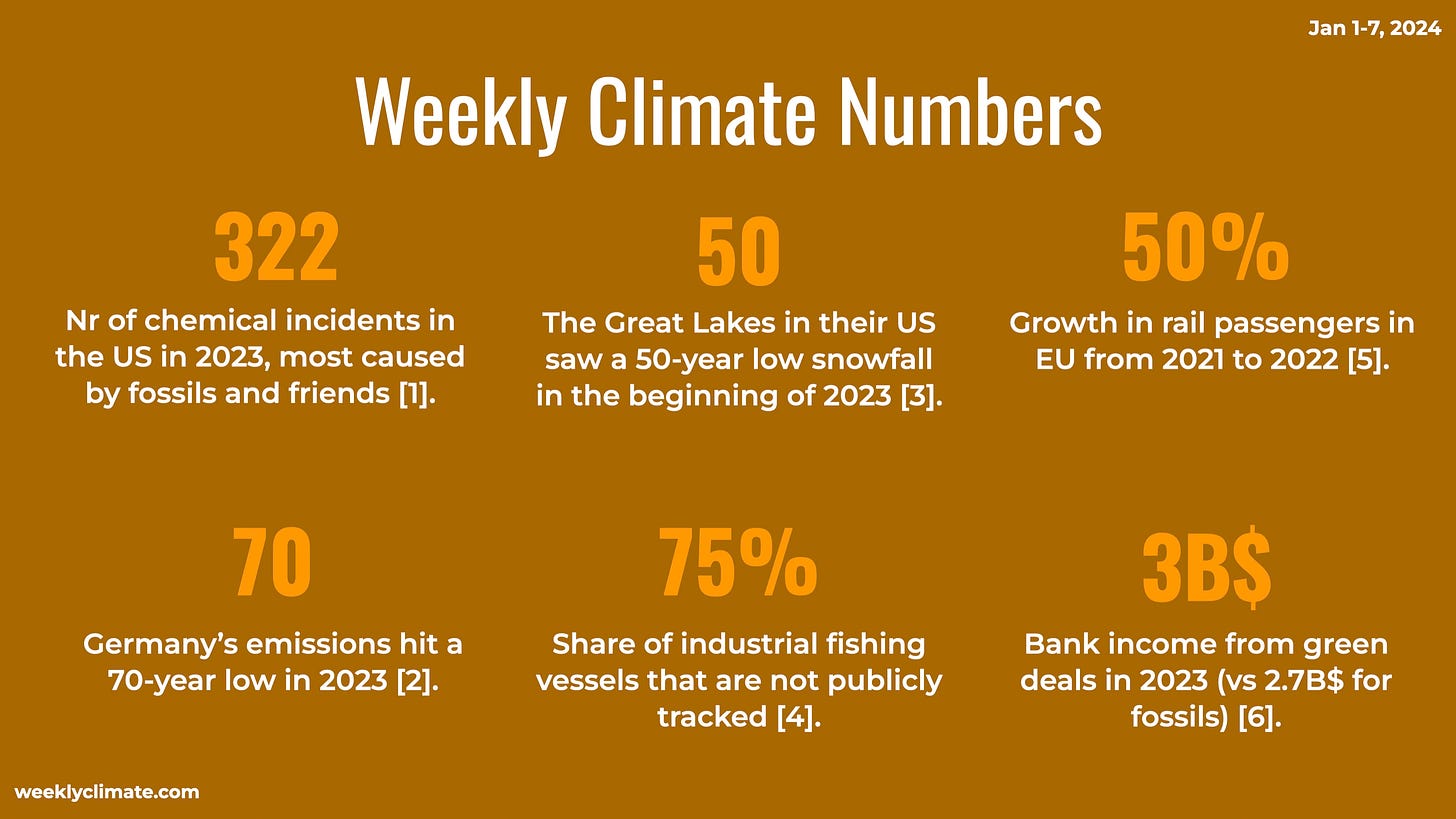[Jan 1-7'24] Happy new year
Steady as she goes for fossils, some signs of hope last year, green investments wins, COP29 presidents is another fossil fuel exec.
Welcome to this week’s edition of The Weekly Climate 🎉
References: [1], [2], [3], [4], [5] and [6].
Happy new year! I hope you had a great one! In true toddler style New Years our New Years was cancelled due to sickness 😅 but oh well I still got to cook some good food and drink some good wine as I was the only one who weren’t sick. Fewer hangovers is also a plus.
In this New Years edition everything is back to normal from our previous COP28 special editions except that for this issue only I’ve included an “2023 review” article section since there were a couple of those that didn’t really fit in anywhere else. Apart from this is was a quite silent first week as I only sifted through about 24 articles as opposed to my usual 50-70.
‼️News you can’t miss
Here’s one important scary/bad (🙀), good (😻), interesting (😼) and fossil (💩) news item.
🙀 Fossil fuel industry continued 2023 by doubling down on their plans to heat the planet
😻 Despite much crap, there were some signs of hope last year
😼 Banks green investments perform better than fossil investments
💩 The fossil fuel industry continue owning the COP, with COP29 president being another (although ex-) fossil fuel exec.
🎆2023 Review article
Articles discussing the year 2023 in the age of the climate crisis.
[#climatepredictions] — This article by Grist provides 24 climate predictions for 2024. Some key takeaways include the surging carbon-capture market, the Republican opposition to ESG investing, the expansion of worker protections in the electric vehicle industry, the EPA's potential retreat from using civil rights law to protect residents, the ongoing testing of "forever chemical" pollution, the uncertain future of the liquefied natural gas industry, legal liability for polluting countries, the mining boom for critical minerals, the funding for "climate-smart" agriculture, the push for renewable energy on public lands, the impacts of El Niño, the migration challenges faced by Pacific islanders, the insurance crisis in disaster-prone states, the slow progress of workplace heat standards, and the impact of "heatflation" on desserts. And here are New York Times’ climate predictions for 2024.
[#hopeful] — Despite the challenges and negative climate news in 2023, there were several signs of climate progress. Global renewable energy deployments surged, with the U.S. adding a record-breaking amount of solar capacity and China on track to meet its 2030 renewable goal early. EV sales continued to grow, with the U.S. reaching one million annual EV sales for the first time. Clean energy prices started falling again, and states passed landmark climate bills. Transmission lines cleared red tape, companies invested in the U.S. clean energy supply chain, and the EPA finalized a new methane rule. Deforestation rates declined in the Amazon, and the EU launched its Carbon Border Adjustment Mechanism.
👩⚕️ Status: Climate & Science
Let’s look at how we’re doing this week!
[#snow] — Record warmth and changing precipitation patterns in the United States are resulting in less snowfall (certainly not the case here in Denmark, where we currently have blizzard like conditions), impacting ski areas, reservoirs, and agriculture. Factors such as record heat and an El Niño event contribute to the decrease in snow. While winter is not over and weather patterns can change, the overall trend is concerning. The article also discusses the visual and rhetorical styles of environmental movement posters and highlights other climate news, including the logging industry's impact on Canada's boreal forests and the melting ice in Siberia.
📰 The 7 Grand Challenges
⚡️Decarbonize Electricity
Clean electricity is the one do-or-die challenge we must solve.
[#oceans] — A new study using deep learning and satellite imagery has created the first global map of vessel traffic and offshore infrastructure, revealing previously unnoticed industrial activity at sea. The research highlights that 75% of the world's industrial fishing vessels and up to 30% of transport and energy vessels are not publicly tracked, posing challenges for global conservation efforts. By analyzing 2,000 terabytes of imagery from the European Space Agency's Sentinel-1 satellite constellation, the study identified areas of dense vessel traffic and a boom in offshore energy development, with wind turbines outnumbering oil structures. The findings emphasize the need for accurate mapping to better protect the world's oceans and fisheries.
[#germanemissions] — Germany's emissions reached a 70-year low in 2023, largely due to a decrease in coal power generation and a decline in production by energy-intensive companies. Renewable sources accounted for over 50% of electricity generation for the first time, while coal's share dropped to 26%. However, the thinktank Agora Energiewende warned that most of the emissions cuts are not sustainable and called for investments to modernize industry and reduce the carbon footprint from heating to meet climate targets.
🏘 Reduce impact of urban and rural areas
Lowering the impact of urban and rural areas.



